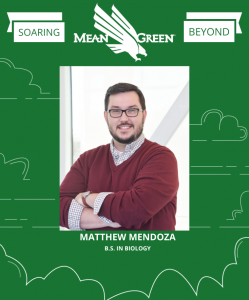MEET MATTHEW! Matthew received a Bachelor of Science in Biology and a Minor in Chemistry in May 2014. Matthew recently completed a Ph.D. in Neuroscience at the UT Southwestern Medical Center.*

We asked Matthew some questions, advice for current students, and how UNT helped him to succeed and SOAR BEYOND!
When you started at UNT, what were your plans after graduation? How have these plans changed (if at all)? My plans have gone through a series of changes! When I started at UNT, I had no concept of college or what to even do with a degree in biology. I entered college as a low-income first-generation college student. My parents virtually dropped me off on campus in August 2008 and essentially told me good luck, as they could not provide any source of financial assistance or emotional support since neither one of them attended college. I haphazardly floated through my first two years of classes assuming I would try to pursue medical school, however, I honestly had no clue what I wanted to do. I started getting involved with academic research, and more specifically was selected to participate in the McNair Scholars Program at UNT in 2011. From that point forward, I knew that a career as a research scientist was more suited to my long-term interests. I was very fortunate to continue my interest in science in 2014 when I was selected for the incoming Ph.D. classes at UT Southwestern Medical Center in Dallas, TX. I am on track to graduate sometime this summer where I hope to use my Ph.D. to drive drug development and therapeutic advancements in the pharmaceutical industry. As I’m sure you can tell my plans have shifted a bit. I initially had no clue what I wanted. That changed to a general thought of pursuing medical school. I then learned that medical school was financially impractical for me, so then I pursued academic research in the form of neuroscience. Recently I have made one additional amendment to my plans and have decided to move away from academic research and more into clinical trial design and drug development.
What advice do you have for prospective or current students as they decide what they want their next steps to be (internships/careers/etc.)? I feel like I have a ton of advice! First, I would recommend students determine what they want out of life as opposed to what their parents or society tells them should do. From there, I believe students, and people in general should align their career search/exploration with their top 3-5 values. Of course, this would require students to identify their values first. Once their values are identified and clearly articulated, then I recommend finding career paths that align with the student’s true self. Lastly, I would also tell students that values change over their lifetime. Therefore, students should welcome changing values and in turn welcome changes in their career.
How did your program at UNT help you to feel prepared for this role? Neuroscience as a field is extremely interdisciplinary. Therefore, I constantly have to pull knowledge from a multitude of different fields like chemistry, physics, and genetics. I even have to pull knowledge from fields outside of science like marketing, communication, and philosophy. My program at UNT gave me a broad perspective, which has undoubtedly aided in my development as a scientist. I’ve published neuroscience research articles, lead a student-based non-profit STEM organization, written educational policies for the UT System, and given countless presentations. My program and participation in UNT clubs and organizations have had a profound impact on my current success. UNT legitimately changed my life, and I anticipate that it will continue to influence the future.
How did you find your current role (website, email, word of mouth, etc)? I found my current role by mostly researching neuroscience Ph.D. programs. I wanted to stay in Texas because of family, and I was very fortunate to be given an opportunity at UT Southwestern Medical Center.
What was the toughest interview question they asked you? The toughest questions were: 1) why do I want a Ph.D. and 2) why should we choose you to be a part of our Ph.D. program? I was definitely asked more science-specific questions, but I’m not sure if those would be too esoteric. I recently interviewed for another position for Bristol Myers Squibb, so I can include some of those questions as well.
How did the Career Center help you? The UNT Career Center helped me tremendously throughout college. I actually worked at the Career Center from 2012 to 2014 as a Career Peer Advisor. Through that position, I had to give a ton of presentations, which helped me overcome my fear of public speaking. I now give over well over 10 presentations per semester in various capacities (e.g research, STEM non-profit, teaching, and some educational policy). Additionally, the UNT Career Center taught me valuable skills in career exploration, application material preparation, and interview skills. I often use these skills today for my own career search.
*Matthew was also a Howard Hughes Medical Institute Gilliam Fellow, a co-founder of the UT Southwestern SACNAS Chapter, and the previous Chair of the UT System Student Advisory Council.
Want to hear more of Matthew’s story? Check out his video testimonial!
You can see more testimonials like Matthew’s here.
Would you like to be featured in our Soaring Beyond Success Series? Email Jeanette Hickl. We’d love to share your story!



